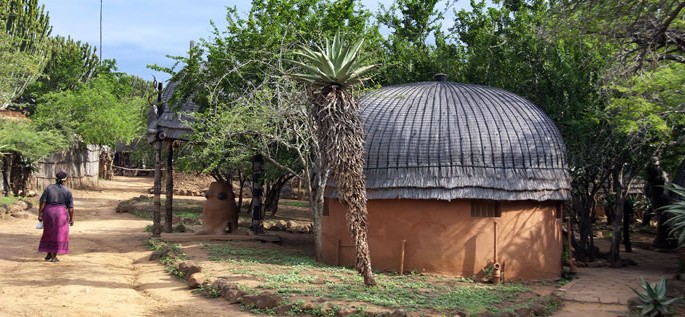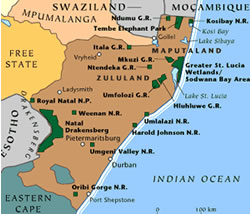
Zulu
Zulu (isiZulu) is a southern Bantoid language spoken in the KwaZulu-Natal Province in South Africa (formerly called Zululand). The Zulu people are thought to have migrated to this area along the east coast of Africa and through central Africa before the 16th century. When they came into contact with Khoisan-speaking people, the Zulus adopted some of the vocabulary, and the click consonants of the Khoisan languages. The first grammar of Zulu was published In 1859.
Zulu is closely related to Xhosa, Swati, and Ndebele. The three are mutually intelligible but are considered to be separate languages for political and cultural reasons. In fact, Zulu and Xhosa are similar enough linguistically to be considered dialects of one language, but the Zulu and Xhosa people consider themselves to be different people who speak different languages.
Status
Zulu, is one of the 11 official languages of the Republic of South Africa where it is spoken by 11.7 6 million speakers as a first language and by an estimated 15.7 million speakers as a second language. Zulu is also spoken in Swaziland, Botswana, Lesotho, Malawi, and Mozambique. The population total for all countries is estimated at 27.7 million people (Ethnologue). Since Zulu is easily understood by speakers of Xhosa, Swati and Ndebele it is used as a lingua franca from Natal to Zimbabwe, often in its pidginized form called Fanagalo, a trade language that is widely used in towns and mining areas of South Africa.
The status of Zulu, like all other African languages in the Republic of South Africa, is complex. Zulu is used in primary schools up to the second grade and is studied as a subject in both primary and secondary schools up to the tenth grade. At the secondary level, instruction in schools serving Zulu-speaking students is in English. All education at the university level is in English or Afrikaans.
There has been a steady growth of Zulu publications since 1930. The South African Broadcasting Corporation has domestic television and radio in Zulu. A number of newspapers and magazines are published in either Zulu, or in a combination of Zulu and English.
Dialects
Ethnologue identifies two dialects of Zulu: Lala and Qwabe.
Structure
Sound system
The phonology of Zulu is characterized by a simple vowel inventory and a complex system of consonants. Most syllables end in a vowel, and there are no consonant clusters.
Vowels
There are five vowel phonemes, i.e., sounds that distinguish word meaning. Vowels can be either short or long. Although vowel length distinguishes word meaning, length is not represented in writing, except for â and ä.
| Close |
i , ii
|
u, uu
|
|
| Mid |
ε, εε
|
ɔ, ɔɔ
|
|
| Open |
a, aa
|
Consonants
Zulu has a complex system of consonants, including some uncommon ones.
1. Clicks
Clicks are stops produced with two points of contact in the mouth: one forward and one in the back. The pocket of air produced by the resulting enclosure is rarefied by the sucking action of the tongue. Release of the forward closure results in a pop-like sound. There are five places of articulation at which click consonants occur. In the International Phonetic Alphabet, clicks are represented by placing the assigned symbol for the place of click articulation to the left of a symbol for a non-click sound at the same place of articulation.
Zulu has the following click consonants which can be modified in a variety of ways, such as aspirated, breathy-voiced or nasalized.
- /kǀ/ = dental click
- /kǁ/ = lateral alveolar click produced by the side of the tongue against the back of the side teeth (similar to the sound made when calling horses in English. In fact, the name Xhosa is pronounced as /’kǁʰ o:sa/.
- /kǃ/ = (post)alveolar click produced with the tip of the tongue against the roof of the mouth (like a cork pulled from a bottle).
2. Implosive consonants
Implosive consonants are produced by inhaling rather than exhaling the air.
3. Breathy-voiced consonants
Breathy-voiced consonants are produced when the vocal cords vibrate, as they do in normal voicing, but are held further apart, so that a volume of air escapes between them. This produces an audible noise. They are marked with a raised /ʱ/.
4. Ejective
Ejective consonants are pronounced with simultaneous closure of the glottis, raising air pressure in the mouth, so that when the sound is released, there is a noticeable burst of air accompanying the release. They are marked with an apostrophe /’/.
Below is a table of Xhosa consonants. The red letters are orthographic representations of the sounds. The inventory is taken from Wikipedia.
| (Post)alveolar | |||||||||
|---|---|---|---|---|---|---|---|---|---|
| Clicks | voiceless plain |
kǀ (c)
|
kǁ (x)
|
kǃ (q)
|
|||||
| voiceless aspirated |
kǀʰ (ch)
|
kǁʰ (xh)
|
kǃʰ (qh)
|
||||||
| voiced breathy |
gǀʱ (gc)
|
gǁʱ (gx)
|
g!ʱ (gq)
|
||||||
| voiced nasalized |
ŋǀ (nc)
|
ŋǁ (nx)
|
ŋ! (nq)
|
||||||
| voiced breathy nasalized |
ŋǀʱ (ngc)
|
ŋǁʱ (ngx)
|
ŋ!ʱ (ngq)
|
||||||
| Stops | voiceless ejective |
p’ (p)
|
t’ (t)
|
x
|
cʼ(ty)
|
k’ (k)
|
‘
|
||
| voiceless aspirated |
pʰ (ph)
|
tʰ (th)
|
cʰ (tyh)
|
kʰ (kh)
|
|||||
| voiced breathy |
bʱ (bh)
|
dʱ (d)
|
ɟʱ(dy)
|
gʱ (g)
|
|||||
| implosive |
ɓ (b)
|
||||||||
| Fricatives | voiceless |
f (f)
|
s (s)
|
ɬ (hl)
|
ʃ (sh)
|
x (rh)
|
h (h)
|
||
| voiced breathy |
vʱ(v)
|
zʱ (z)
|
ɮ (dl)
|
ɣ̈ (gr)
|
ɦ(hh)
|
||||
| Affricates | voiceless ejective |
ts’ (ts)
|
tʃ‘ (tsh)
|
kx’ (kr)
|
|||||
| voiceless aspirated |
tsʰ(ths)
|
ʧʰ (thsh)
|
|||||||
| voiced breathy |
ʤʱ (j)
|
||||||||
| Nasals | voiced plain |
m (m)
|
n (n)
|
ɲ (ny)
|
ŋ (n’)
|
||||
| voiced breathy |
mʱ (mh)
|
nʱ (nh)
|
ɲʱ(nyh)
|
||||||
| Approximants | voiced |
w (w)
|
l (l)
|
y (y)
|
|||||
| voiced breathy |
wʱ( wh)
|
lʱ (lh)
|
yʱ(yh)
|
||||||
- /ʃ/ = sh in shop
- /tʃ/ = ch in chop
- /c, ɟ, ɬ, ɮ, x, ɦ, ɣ̈/ have no equivalents in English
Tones
Zulu has two tones: high and low.
Grammar
Zulu is an agglutinative language, i.e., grammatical functions are expressed by adding prefixes and suffixes to stems.
Nouns
- Zulu nouns belong to 15 different classes, roughly based on semantic features. There are classes for human beings, animals, plants, objects of various shapes, etc. Not all noun classes can be easily defined. Each class has a different set of prefixes for marking numbers (singular and plural).
- There are no cases.
- There are no definite or indefinite articles.
- Gender is not marked.
- Adjectives, possessive pronouns and demonstratives agree with the noun they modify in class and number, e.g., abantu abaqatha ‘people strong’ where aba– is a noun class marker repeated in the modifier abaqatha ‘strong.’
Verbs
Zulu verbs are highly inflected. Verbs consist of a root plus prefixes and suffixes that represent different verbal categories such as subject and object agreement, tense, causation, reciprocity, negation, and aspect. They appear in fixed order, much like in Xhosa.
Word order
The normal word order in Zulu is Verb-Object (the subject is part of the verb compound). Adjectives, possessive pronouns and demonstratives come after the noun they modify.
Vocabulary
Zulu, Xhosa, Ndelebele and Swati share most of the basic vocabulary and grammar. Like other Southern Bantu languages, Zulu has borrowed words from the Khoisan languages, and from English and Afrikaans. Compare these equivalents of ‘What’s your name?’ in these four languages:
| Zulu | Ungubani igama lakho? |
| Xhosa | Ngubani igama lakho? |
| Ndelebele | Ungubani igama lakho? |
| Swati | Ngubani ligama lakho? |
Below are a few common words and phrases in Zulu.
| Hello (to one and to more than one respectively). | Sawubona, sanibonani. |
| Good bye (to one and to more than one respectively | Hamba kahle, hambani kahle. |
| Please. | Ake. |
| Thank you. | Ngiyabonga. |
| Excuse me. | Uxolo. |
| Yes. | Yebo. |
| No | Cha. |
| Man (male) | Umlisa. |
| Woman (married), woman (unmarried) | Inkosikazi, inkosazana |
Below are Zulu numerals 1-10.
|
1
|
2
|
3
|
4
|
5
|
6 | 7 | 8 | 9 | 10 |
|---|---|---|---|---|---|---|---|---|---|
|
kunye
|
-bili
|
-thathu
|
-ne
|
hlanu
|
isithupha
|
isikhombisa
|
isishiyagalombili
|
isishiyagalolunye
|
ishumi
|
Writing
Zulu has a Roman-based orthography which was developed by Christian missionaries in the 19th century and adapted to represent the sounds of the language. Dental clicks are represented by the letter c, alveolar clicks are indicated by q, and lateral clicks are written with the letter x. Neither vowel length, nor tones are represented in writing.
Take a look at Article 1 of the Universal Declaration of Human Rights in Zulu.
| Isigaba 1 Bonke abantu bazalwa bekhululekile belingana ngesithunzi nangamalungelo. Bahlanganiswe wumcabango nangunembeza futhi kufanele baphathane ngomoya wobunye. |
| Article 1 All human beings are born free and equal in dignity and rights. They are endowed with reason and conscience and should act towards one another in a spirit of brotherhood. |
Did You Know?
Zulu words in English
| Impala | from Zulu im-pala ‘gazelle’ |
| Mamba | large venomous snake from Zulu (i)mamba or Swahili mamba. |
| Sangoma | practitioner of traditional herbal medicine in traditional South African communities |
Difficulty

Zulu is a Category II language in terms of difficulty for speakers of English.
